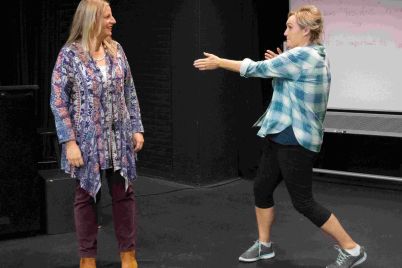
A professional student must balance conflicting responsibilities. Vardan Sargsyan | Washtenaw Voice
By Nicholas Ketchum
Deputy Editor
We’re right back to where we started: the dawn of a fall semester. This is when students tell the best self-lies, such as “I’m going to stay on track this time” and “I’m gonna get a 4.0 in every class.”
Sure. Right. Right?
Cue the professional student.
According to Wikipedia there are three definitions for a professional student, none of which suit the scenario this article describes.
Here’s a new definition: a professional student is one who prioritizes school as a job, a real career step and a gig worth acing; a student who brings professionalism and strong ethics to learning and academics, in general.
Here are some student success tips from Cindy Kowall, a part-time faculty instructor at WCC, as well as yours truly, a self-described “professional student.”
Manage your time
An anonymous sage once supposedly said, “It is astonishing how long it takes to finish something you’re not working on.”
If possible, reserve time each day to dedicate to course work. Put it on your planner or calendar, which you should have.
A schedule, planner or calendar is mandatory for the professional student—there are too many due dates, exam dates and other easy-to-forget items. Once the syllabus is in-hand, it’s a good idea to enter everything with a date or time at the very start.
According to Kowall one of the biggest surprises students have is how much time is expected outside of class. Students should reserve up to twice the amount of credit hours per course each week.
“I think a lot of students take a three credit hour class and say, “three hours a week and I’m good!” when really they’re expected to spend twice that much time outside of class. So if they’re taking a three credit hour class they may—depending on the course—have to spend up to six hours outside of class,” Kowall said.
Be self-disciplined
One tired debate pits discipline against motivation, asking which is better. Motivation feels great, but it’s fleeting and is never around when you need it.
Discipline is a grumpier, gritier thing, which requires you be your own drill sergeant.
How to develop self discipline? By making clear priorities.
Coursework, like real-world work, has a nasty habit of conflicting. It’s best to focus on one thing at a time.
Kowall recommends lists, with important items at the top and periodically re-ordering as circumstances permit.
Kowall said students may consider “weighting” assignments, prioritizing them either based on points or due date.
“If you have something worth 20 points, or 2 percent, in one class, but another thing worth 200 points or 20 percent in another, you want to put the higher-value assignment before the lower,” she said.
Handwrite notes, and write in general
Shelby Foote, novelist and historian, wrote his novels with a dip quill pen. He claimed it slowed his writing and forced him to think clearly. You may want to try his method yourself.
Additionally, a 2014 study by Psychological Science shows handwritten notes help with long-term information recall, compared to typed.
Annotating course reading helps comprehension, according to Kowall. She said students can better understand material when they note questions or comments as they read the text.
Kowall also recommends Cornell Notes for in-class note taking, as well as annotations and time-stamping recorded lectures.
When brainstorming: keep a pen/notebook or smartphone/voice recorder handy to record ideas when they arise naturally. Inspiration often strikes randomly, away from keyboards.
When suffering writer’s block: just write anything. Kowall recommends to simply keep the pencil/keys moving, and see what happens. Remember, drafts—especially early ones—are rarely pretty sights.
Participate in class
The prerequisite to participation is showing up to class, which instructors shout from rooftops from day one.
Make sure to go to the first class and gauge the instructor’s participation preferences, in case it’s not mentioned on the syllabus.
Ask questions and “lean in” during class discussion. Be curious and dig. Those annotations from readings will be handy just about now.
As a professional student, you’re also modeling ideal behavior to newer students.
Manage anxiety
Kowall says keeping a journal is one way to deal with academic anxiety. She said anxiety and depression are the most common topics her students discuss in their classroom journals, which she assigns each semester.
She also advised that students suffering from anxiety, depressio should seek help from campus resources.
“What I tell my students is if they’ve been diagnosed with a disability or have something in play, one of the first places they should go is to Learning Assistance or Disability Services and get accommodations,” she said. “Do it before you have an issue, since they work with you [from the point of the first visit].”
WCC also offers one-on-one counseling.
Supplement class materials
Use drill sheets, flash cards and smartphone apps in your down time, such as when you’re standing in line at the store.
Employ mnemonics to recall dense material. Can’t remember sine, cosine, tangent and the other trig functions? Well, you might remember “SohCahToa.” You can invent your own mnemonics for many topics—they work.
Hit up Khan Academy, MIT Youtube and university faculty websites (such as Paul’s Online Notes for Calculus practice) for supplementary materials and additional lectures.
See a tutor if things get ugly.


